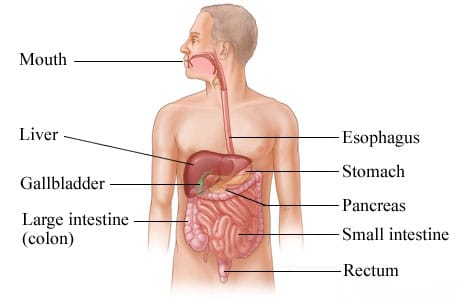
What does your digestive system do?
Your digestive system takes in food, breaks it down into the nutrients and energy your body needs, and then gets rid of the waste. Most of your digestive system is a long tube that runs from your mouth to your rectum. This "tube" includes your esophagus, stomach, and intestines. Your digestive system also includes organs that help digestion, such as the pancreas and liver.
The major parts of your digestive system are your:
- Mouth and esophagus. Your mouth takes in food, breaks it into small pieces, and moistens it with saliva. Your esophagus pushes it to your stomach.
- Stomach. The food starts to break down in your stomach and mixes with stomach acid. As the food dissolves, your body begins to absorb the nutrients.
- Small intestine. Your small intestine is a winding, tightly folded tube. It does most of the work of digesting food and absorbing nutrients.
- Large intestine (colon). The part of your food that is not absorbed (waste) goes through the large intestine. Most of the water from your food is absorbed there. The waste that is left is stool (feces). It is pushed to the rectum.
- Rectum. Your rectum is a short tube at the end of the large intestine. It connects your colon to your anus. The anus pushes stool out of your body.
- Liver, pancreas, and gallbladder. Food and waste don't go through these organs. But these organs help your digestion.
- Your liver helps with the breakdown of food into the nutrients the body can use.
- Your pancreas makes digestive enzymes that break down food into nutrients.
- Your gallbladder stores a fluid called bile that helps your body digest fats.
What problems can happen with your digestive system?
Digestive problems may include:
- Constipation. This means that you have hard and dry stools that are difficult to pass.
- Diarrhea. This is loose, watery stools.
- Nausea or vomiting.
- Heartburn. This is caused by stomach juices flowing backward into the esophagus.
- Gallbladder problems, such as gallstones.
- Hemorrhoids.
- Irritable bowel syndrome (IBS). This is bloating, belly pain, and gas. It often gets worse after you eat or during times of stress.
- Peptic ulcers. These are sores in the lining of the stomach.
- Crohn's disease. In this disease, any part of the digestive tract may be inflamed.
- Ulcerative colitis. The large intestine is inflamed.
- Diverticulitis. The intestinal wall is inflamed.
- Pancreatitis. The pancreas is inflamed.
- Cirrhosis. This is inflammation and scarring of the liver.
- Cancer of any part of the digestive system.
How can you prevent digestive problems?
Some digestive problems, such as ulcerative colitis, can't be prevented. But you can do a lot to prevent other problems or make them better. Most of these things also promote a healthy lifestyle.
- To help keep your digestive system healthy:
- Get at least 30 minutes of exercise on most days of the week. Walking is a good choice.
- Stay at a healthy weight through exercise and eating a variety of healthy foods like fruits, vegetables, whole grains, and lean protein.
- To avoid constipation:
- Include fruits, vegetables, beans, and whole grains in your diet each day. These foods are high in fiber. If needed, take a fiber supplement, such as Citrucel or Metamucil, every day. Read and follow all instructions on the label.
- Schedule time each day for a bowel movement. Having a daily routine may help. Take your time and do not strain when having a bowel movement.
- Drink plenty of fluids. If you have kidney, heart, or liver disease and have to limit fluids, talk with your doctor before you increase the amount of fluids you drink.
- To prevent diarrhea, avoid food or water that may be contaminated with harmful germs, such as bacteria. Eating raw or uncooked seafood and meat puts you at higher risk for getting sick. When you travel, avoid drinking the local water. Also avoid foods like salads, uncooked vegetables, and raw fruits that don't have a peel.
- To help prevent cirrhosis of the liver, limit alcohol to 2 drinks a day for men and 1 drink a day for women.
- To prevent or ease digestive symptoms:
- Do not smoke. Smoking can make digestion problems worse. If you need help quitting, talk to your doctor about stop-smoking programs and medicines. These can increase your chances of quitting for good.
- Manage stress through deep breathing, guided imagery, or exercise. Any activity that helps you relax will help.
Current as of: October 19, 2024
Author: Ignite Healthwise, LLC Staff
Clinical Review Board
All Ignite Healthwise, LLC education is reviewed by a team that includes physicians, nurses, advanced practitioners, registered dieticians, and other healthcare professionals.

